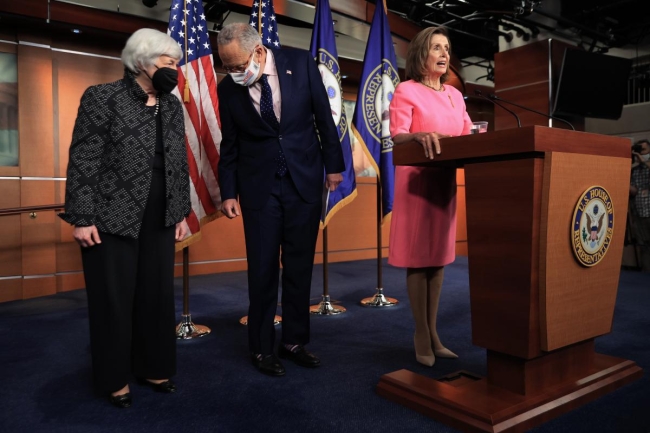You have /5 articles left.
Sign up for a free account or log in.

Democratic leaders Nancy Pelosi of California (right) and Chuck Schumer of New York hold a press conference alongside Treasury Secretary Janet Yellen (left).
Chip Somodevilla/Getty Images
At the same time that Congress is trying to keep the federal government from shutting down at the end of this week, it’s also facing a deadline to keep the United States from defaulting on its loans -- a never-before-seen outcome that would impact higher education, and the economy over all, in disastrous but still mostly unknown ways.
It’s all the result of the debt ceiling, which is a restriction on how much money the federal government can borrow to pay its obligations. According to Treasury Secretary Janet Yellen, the country is due to run out of its ability to pay its bills between mid-October and early November, so Congress needs to raise the debt ceiling before then to allow the Treasury Department to borrow more money.
Though raising the debt ceiling is typically a bipartisan process, Republicans opposed doing so during a procedural vote Monday evening, arguing that it will encourage more federal spending by Democrats -- such as the $3.5 trillion budget reconciliation bill, which includes free community college, funding for minority-serving institutions and an increase to the Pell Grant. Instead, they want Democrats to figure out how to raise the debt limit on their own, rather than attaching it to legislation that keeps the federal government open, which is where it currently stands.
“If they want to tax, borrow and spend historic sums of money without our input, they’ll have to raise the debt limit without our help,” Senate Minority Leader Mitch McConnell, a Republican from Kentucky, said last week on the Senate floor. “This is the reality. I’ve been saying this very clearly since July.”
It’s almost impossible to know what would happen if the U.S. defaults on its loans because it would be such a disaster, said Sandy Baum, a nonresident senior fellow for the Center on Education and Data Policy at the Urban Institute.
“I have to believe they will raise the debt ceiling, because it’s like the economy is at risk of collapsing,” Baum said. “There are so many terrible things that would happen that picking out what would happen to higher education … I don’t think anybody really knows what they would do or what would happen.”
At least one outcome seems obvious if Congress doesn’t act: it’s difficult to disburse financial aid if the federal bank account doesn’t have any money in it, said Justin Draeger, president and CEO of the National Association of Student Financial Aid Administrators. If there are no funds at the Treasury and no way to raise capital, the federal government will become dependent on incoming revenue.
“The good news for students is that the largest tranches of federal student aid are made at the beginning of the terms and will have already come and gone by the time Treasury runs out of money,” Draeger said. “But that will be small consolation to the students who are expecting and depending on upcoming disbursements.”
The debate surrounding the debt ceiling and federal spending raises larger questions about the national debt at a time when many Democrats are looking to make monumental investments in higher education.
“I think the issue with the national debt is simply cooling off desires among voters and policy makers alike to spend, spend, spend on everything under the sun,” said Beth Akers, a senior fellow at the American Enterprise Institute. “The current issues with the debt ceiling are only calling attention to the issue of spending beyond our means.”
That includes the Build Back Better Act, which is based heavily on President Biden’s American Families Plan but fails to deliver the level of investments that Biden initially proposed -- for example, tuition-free community college would be authorized for five years instead of 10, and historically Black colleges and universities didn’t see the level of infrastructure investment that leaders believe is necessary.
The moderate and progressive wings of the Democratic party are divided on how much the reconciliation bill should cost -- centrist Democratic senator Joe Manchin of West Virginia said earlier this month in an op-ed that he would not vote for a package that spends another $3.5 trillion.
“Many in Washington have convinced themselves we can add trillions of dollars more to our nearly $29 trillion national debt with no repercussions,” Manchin wrote. “For those who will dismiss my unwillingness to support a $3.5 trillion bill as political posturing, I hope they heed the powerful words of Adm. Mike Mullen, a former chairman of the Joint Chiefs of Staff, who called debt the biggest threat to national security. His comments echoed the fear and concern I’ve heard from many economic experts I’ve personally met with.”
So, is the unwillingness to add to the national debt by some lawmakers inhibiting more federal spending on higher education? Not quite, say policy experts.
“I don’t think there are that many people who think we’re on the brink of disaster because of the national debt,” Baum said. “And certainly, when we’re talking about the types of spending that are in these bills -- most of which is investment in the future -- it’s much more about, ‘We don’t want to spend that money’ than it is about the national debt.”
The debate over the national debt is much more about politics than it is about policy, said Terry Hartle, senior vice president for government relations and public affairs at the American Council on Education.
“The Republicans, I don’t think were ever going to support President Biden’s initiatives for political reasons -- the national debt provides a convenient explanation for that lack of support,” Hartle said.




